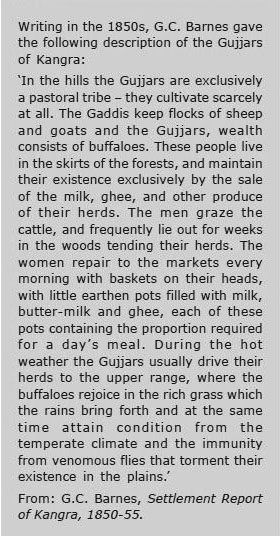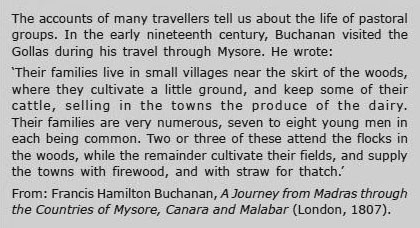Question 1:
Explain why nomadic tribes need to move from one place to another. What are the advantages to the environment of this continuous movement?
Answer:
The nomadic tribes need to move from one place to another because:
(i) They do not have regular fields to get fodder for their herds. They need pastures to
graze their
livestock.
(ii) They cannot stay for long in one area because availability of pasture and water is
limited.
(iii) In winter, when the high mountains are covered with snow, they live in lower hills.
The dry scrub
forests provide pasture for their herds.
(iv) In summer, the nomads begin climbing up the mountain slopes to the summer grazing
grounds.
With the onset of summer, snow melts and the mountain fields turn green.
Therefore, they complete a cyclic (continous) movement between summer and winter in the
hilly
areas.
Advantages to the environment: The cyclic movement of the pastoralists allows sufficient
time for
restoration of natural vegetation. The vegetation on the higher tracts of mountains and on
the foothills
are not allowed to overgrow, and it is utilised by humans and animals. The continuous
movement of
the pastoralists adds manure to the fields and allows the pastures to recover. Grazing on
the pastures
prevents overuse of land for cultivation and other purposes.
Question 2:
Discuss why the colonial government in India brought in the following laws. In each case,
explain
how the law changed the lives of pastoralists:
(i) Waste Land Rules (ii) Forest Acts
(iii) Criminal Tribes Act (iv) Grazing Tax
Answer:
(i) Waste Land Rules: The colonial rulers passed the Waste Land Rules because they considered
uncultivated lands as waste land. Waste Land Rules were enacted in various parts of the
country
in the mid-nineteenth century. Through these laws, uncultivated lands were taken and given
to
certain individuals. These individuals were given several concessions and cultivation was
promoted.
Some of them were made village headmen too. The areas used by the pastoralists for grazing
animals were cleared.
Therefore, the increase in cultivation led to decline of pastures creating many difficulties
for the
pastoralists.
(ii) Forest Acts: In the mid-nineteenth century, several Forest Acts were enacted in
different
provinces. Through these Acts, many forests were declared 'reserved', especially where
deodar
and sal trees grew. These trees provided timber in large quantities. Some other forests were
declared as 'protected'. The colonial rulers felt that grazing prevented new plants,
saplings and
shoots from growing. As a result, the pastoral communities could not easily move with their
herds
in the forests. In a few areas, the customary rights of the herders were preserved, but with
several
restrictions. The entry and exit into the forests was closely watched, and the timings were
fixed.
Anyone who disobeyed was fined or punished.
The Forest Acts gravely changed the lives of the pastoralists. They could not secure forage
for
their livestock which led to rapid decline in the animal stock. The trade and earnings of
the
nomadic communities were also affected.
(iii) Criminal Tribes Act: The British officials wanted to control the lives of their
subjects. They largely
distrusted the nomadic and pastoral communities. In 1871, the Criminal Tribes Act was passed
by
which several communities of traders, craftsmen and pastoralists were declared as criminal.
These pastoralists were obliged to stay in particular villages under close inspection of the
local
police. They had to acquire permits to move to other areas. Thus, several restrictions were
imposed on the activities of the pastoralists.
(iv) Grazing Tax: The colonial government imposed several taxes on the nomads and herders
for use
of resources. Taxes were imposed on use of canal water or land as well as trade in goods. In
the
mid-nineteenth century, taxes on grazing were introduced in all the pastoral areas. The
herders
had to pay the tax on cattle per head which kept on increasing. Between the 1850s and 1880s,
the
government auctioned contractors to collect taxes on their behalf. These contractors
collected
very high taxes from the local people. The government then began to directly collect taxes
from
the 1880s.
As a result, the pastoralists had to sell their animals to pay the high taxes. They also
started
borrowing money from the moneylenders. Thus, the livestock owned by the pastoralists started
to decline.
Question 3:
Give reasons to explain why the Maasai community lost their grazing lands.
Answer:
The Maasai community have lost their grazing lands over the years due to the following
reasons:
(i) The lives of the African pastoralists have changed drastically in the colonial and
post-colonial
phases. In the 19th century, the European powers were fighting for colonies. They occupied
several regions which were divided by multiple international borders.
(ii) Maasailand was divided between the British and the Germans. The Maasai community was
pushed into a small area which considerably reduced their grazing lands.
(iii) The colonial rulers promoted cultivation on pasture lands. The movement of herders was
restricted in these settlements. The Maasais, therefore, lost their grazing areas.
(iv) The Maasais were forced to live in a dry area where there was little water and poor
pasture.
They could not graze their herds in such areas.
(v) The Maasai community was not left with many pasture tracts. As a result, their livestock
declined
and their economic conditions became worse.
(vi) The British converted many forests into game reserves like the Maasai Mara, Serengeti
National
Park and Samburu National Park. This led to a fall in pasture lands.
Question 4:
There are many similarities in the way in which the modern world forced changes in the lives
of pastoral communities in India and East Africa. Write about any two examples of changes
which were similar for Indian pastoralists and the Maasai herders.
Or
Bring out any five similarities between Indian pastoral communities and the life of East African pastoral communities under colonial rule.
Answer:
Both India and East Africa were colonies under European colonial powers. Therefore, their
exploitation
was based on somewhat similar lines.
(i) One of the problems which the Maasai people have faced is the continuous loss of their
grazing
lands. The colonial government encouraged the local peasants to expand cultivation. In India
too,
the colonial power transferred the pasture lands from common people to individuals.
(ii) Large areas of grazing lands were turned into game reserves in Africa. The pastoralists
were not
allowed to enter in these reserves. In India as well, vast pastoral lands were reserved for
hunting
and sport.
(iii) Both in India and Africa, forests were declared either reserved or protected. As a
result, the
pastoralists were not allowed to enter and graze their animals in these forests. The nomads
lost
their traditional rights like the use of timber, fuels and fodder for their livestock.
(iv) Both in India and East Africa, the pastoralists were forced to give up their
traditional occupations
and lifestyles.
(v) In both the regions, the pastoral communities were looked down with suspicion and were
left
deprived.
Question 5:
Imagine that it is 1950 and you are a 60-year-old Raika herder living in post-Independence
India.
You are telling your grand-daughter about the changes which have taken place in your
lifestyle after
Independence. What would you say?
Answer:
I would tell my grand-daughter about the fall in pasture lands. After Independence, the herders cannot freely move in the desert region. The Sindh province has become a part of Pakistan and the herders cannot go there. There are regulations on mobility and use of resources. There is not enough vegetation and water for the animals to survive. The government imposes several taxes on the activities of the Raikas. The trade of the Raikas has declined, and the pastoralists are choosing other occupations or taking loans. Many of them work as agricultural labourers. Hence, the Raikas have to face a number of problems. (Answers may vary.)
Question 6:
Read the extract and answer the following:
Write briefly about what they tell you about the nature of the work undertaken by men and
women in pastoral households.
Answer:
Men were given the responsibility to do outdoor activities such as taking their herds for grazing. The women, on the other hand, carried milk and milk products to the markets for selling them.
Question 7:
Read the extract and answer the following:
(ii) Why do you think pastoral groups often live on the edges of forests?
Answer:
Pastoral groups usually live on the edges of forests due to easy accessibility for food and fodder for their livestocks.
Question 8:
Write a comment on the closure of the forests to grazing from the standpoint of:
(i) a forester
(ii) a pastoralist
Answer:
(i) The life of a forester depends largely on the forests. The closure of his access to the
forests will adversely affect his life. He will have to face many difficulties to
survive.
(ii) Similarly, the life of a pastoralist is closely related to the forest. The closure of
the forests for grazing would severely affect his way of living.
Question 9:
Imagine you are living in the 1890s. You belong to a community of nomadic pastoralists and craftsmen. You learn that the Government has declared your community as a Criminal Tribe. Describe briefly what you would have felt and done.
Answer:
I would have suffered a lot due to such regulations. My movement and economic activities would be restricted. This would result in loss of forage for my herds and I would probably look for other occupations. I would have organised the people from my community to unite themselves and appeal to the Government for cancelling these laws. (Answers may vary.)


